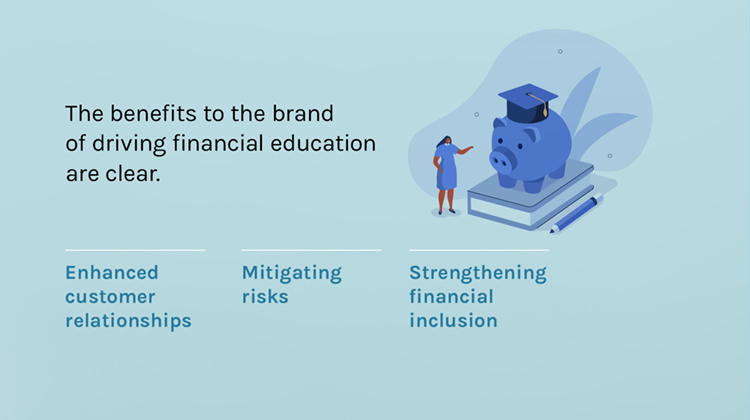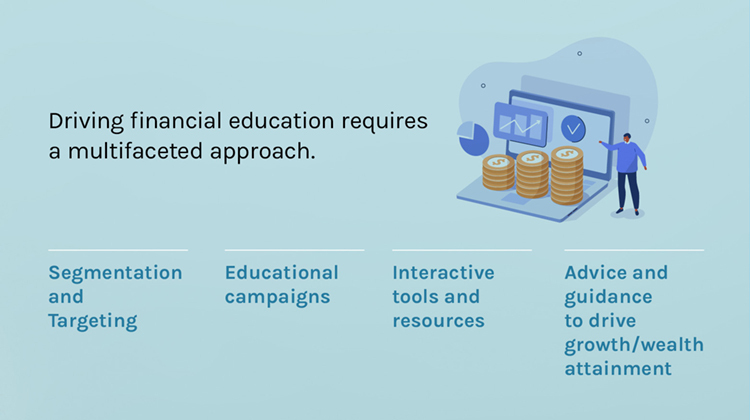Financial literacy, more specifically the lack thereof, continues to negatively impact the financial well-being of millions of households, despite living in an age where an abundance of information is available at our fingertips.
Financial Services providers are conduits enabling consumers to achieve their financial goals. When a lack of financial knowledge creates a roadblock, it often impacts the bottom lines of the firms these consumers use. Critically, a financial services firm that can drive financial education and empower customers to achieve their own goals will create sticky relationships and drive customer lifetime value.
Radius Financial has seen the opportunity to drive deeper financial education emerge as a Macro Trend across work we have conducted over the past 18 months within the financial services space, including retail banking, business banking, insurance, fintech, investment banking, and financial advisory services.
In this article, we uncover consumer attitudes and needs for financial education, the reasons why financial services brands should strive to improve financial education, and the ways primary market research can pave the way for effective strategies to drive improvement.
The Current Situation
One universal truth holds true across the studies we have conducted recently about financial education or knowledge: The majority of both retail consumers and B2B financial decision makers want more education and information to enable them to optimize their personal or business financial well-being.
Consumers are hungry for information.
Retail consumers tell us that they need access to a wide range of information so that they can make the best possible financial decisions for them and their families. Financial Services (FS) partners that can provide this information, in an unbiased manner, stand to benefit from more connected bonds with consumers.
It is worth noting that many consumers are now turning to various social media platforms, such as TikTok, for financial advice and education. Specifically, long-term investing and retirement planning are the two most common topics where consumers report a knowledge gap.
Clients in the B2B space benefit from peer advice.
B2B financial decision makers desire advice based on industry specific knowledge and how to plan for specific economic conditions. B2B clients also seek continuous education on the ways their firms can benefit from different financial vehicles and technology-based applications and expect the FS providers they do business with to keep them informed to this end. Efficiency, profitability, and growth are the most common underlying motivators.
Why financial brands should focus on driving financial education.
Financial services brands are uniquely positioned to play a pivotal role in shaping the financial well-being of their customers. Beyond offering products and services, they can empower individuals and businesses with the knowledge and skills necessary to make sound financial decisions. The benefits to the brand of driving financial education are clear.

- Enhanced customer relationships: By actively promoting financial literacy and education, FS brands can foster trust and loyalty among their customer bases. Empowering individuals and businesses to make informed choices aligns with the ethos of customer-centricity, laying the groundwork for long-term relationships.
- Mitigating risks: A financially literate customer base is less susceptible to fraud, predatory practices, and mis-selling of financial products. Educated consumers and businesses are better equipped to identify red flags, assess risks, and safeguard their monetary interests.
- Strengthening financial inclusion: Improving financial literacy is integral to promoting financial inclusion. By reaching out to underserved communities and providing educational resources, FS brands can bridge the gap and empower individuals from diverse backgrounds to participate actively in the financial ecosystem.
Market research helps brands develop financial education strategies and tactics.
Driving financial education requires a multifaceted approach. Here are a few ways FS brands can effectively champion financial education initiatives and leverage market research to diagnose, optimize, and monitor initiatives.

- Segmentation and Targeting: Conduct research to understand the needs, preferences, and pain-points of different customer segments. Personalize educational content and outreach efforts based on the specific gaps and financial circumstances of each segment.
- Educational campaigns: Develop comprehensive educational campaigns encompassing various aspects of financial literacy, including budgeting, savings, investment, debt management, asset protection, and retirement planning. Research can be used to identify the most effective message frameworks and content formats to drive engagement.
- Interactive tools and resources: Leverage technology to create interactive tools, calculators, and educational resources to facilitate learning and decision-making. Usability testing can help to refine these resources and ensure they cater to the needs of diverse audiences.
- Advice and guidance to drive growth/wealth attainment: Particularly for business clients, use relationship bankers/advisors and sector expertise to play the role of a trusted advisor in educating executives on the best growth opportunities. Qualitative research can be used in these cases to fully understand the objectives and intrinsic motivators of business executives and identify informational gaps that exist.
The imperative to drive better financial literacy rates among customers is paramount for financial services brands. By addressing the current shortcomings in financial literacy, FS brands can not only foster stronger customer relationships and mitigate risks but also contribute to broader societal goals of financial inclusion and empowerment. Leveraging market research insights, they can design and implement impactful strategies that resonate with diverse audiences, paving the way for a more financially literate and prosperous future.
Want to leverage customer input to develop targeted education programs?




